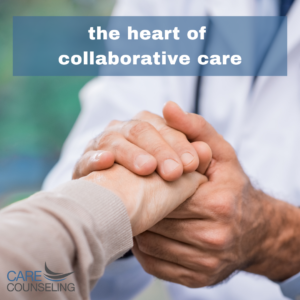The Heart of Collaborative Care
 At the core of collaborative care is the unwavering commitment to putting patients first, recognizing their unique needs, and fostering a multidisciplinary approach that revolves around their holistic health. In this blog post, we’ll explore how collaborative care places patients at the heart of healthcare, leading to improved outcomes, enhanced experiences, and a patient-centric healthcare system.
At the core of collaborative care is the unwavering commitment to putting patients first, recognizing their unique needs, and fostering a multidisciplinary approach that revolves around their holistic health. In this blog post, we’ll explore how collaborative care places patients at the heart of healthcare, leading to improved outcomes, enhanced experiences, and a patient-centric healthcare system.
- The Patient-Centered Approach
Collaborative care is built upon the fundamental principle of patient-centeredness. It recognizes that patients are not just passive recipients of medical care but active participants in their own well-being. By involving patients in shared decision-making and considering their preferences and values, collaborative care empowers them to take control of their health.
In a collaborative care model, healthcare providers take the time to understand each patient’s unique circumstances and tailor their care accordingly. This individualized approach not only ensures that medical treatments are aligned with the patient’s goals but also enhances the overall patient experience.
- Comprehensive and Holistic Care
Collaborative care goes beyond the traditional silos of healthcare disciplines. It brings together a team of professionals from various backgrounds, including physicians, nurses, pharmacists, social workers, and mental health experts, to provide comprehensive and holistic care.
This approach recognizes that health is not solely defined by physical well-being but encompasses mental, emotional, and social aspects as well. For instance, a patient suffering from a chronic illness may require not only medical treatment but also emotional support and lifestyle adjustments. In a collaborative care setting, these diverse needs are addressed collectively, leading to more effective and well-rounded care.
- Improved Outcomes
Putting patients first through collaborative care results in improved patient outcomes. When healthcare providers work together as a team, they bring their unique expertise to the table, contributing to a more thorough and informed care plan. This integrated approach is particularly advantageous for patients with complex medical conditions or those facing multiple health challenges.
By reducing the chances of medical errors and ensuring that all aspects of a patient’s health are considered, collaborative care leads to better treatment plans and, ultimately, better health outcomes. Patients under this model are more likely to see their conditions managed effectively, experience shorter recovery times, and enjoy a higher quality of life.
- Enhanced Patient Experience
The patient experience is significantly enhanced through collaborative care. When patients witness a team of healthcare professionals working together in their best interest, it instills confidence and trust. This approach also reduces the need for redundant tests and procedures, streamlining the patient’s journey through the healthcare system.
In a collaborative care environment, patients feel valued, heard, and actively engaged in their care plans. They are encouraged to ask questions, seek clarification, and participate in making decisions about their health. This shift from a passive recipient of care to an active participant fosters a more positive and satisfying patient experience.
- Empowering Patients with Knowledge
Collaborative care emphasizes patient education as a vital component of healthcare. In this model, patients are provided with the information and resources they need to understand their conditions, treatment options, and self-management strategies. This empowerment through knowledge not only leads to better adherence to treatment plans but also equips patients with the skills to take charge of their health independently.
By fostering patient education, collaborative care reduces the knowledge gap between healthcare providers and patients, promoting shared decision-making. Patients are more likely to adhere to treatment plans when they understand the rationale behind them, leading to better long-term outcomes.
- A Promising Future for Healthcare
Collaborative care is not just a trend but a fundamental shift in the healthcare landscape. It places patients at the heart of healthcare and acknowledges their rights to participate in decisions about their well-being. This approach recognizes the interconnectedness of physical, emotional, and mental health, leading to a more comprehensive and holistic model of care.
As the healthcare industry continues to evolve, we can expect to see more healthcare systems and providers adopting collaborative care as the standard. This transformative model prioritizes patients, improving their outcomes, enhancing their experiences, and ultimately building a more patient-centric healthcare system.
Putting patients first through collaborative care is the hallmark of a patient-centric healthcare system. By involving patients in decision-making, providing comprehensive care, improving outcomes, enhancing the patient experience, and empowering patients with knowledge, collaborative care is reshaping the way we approach healthcare.



























